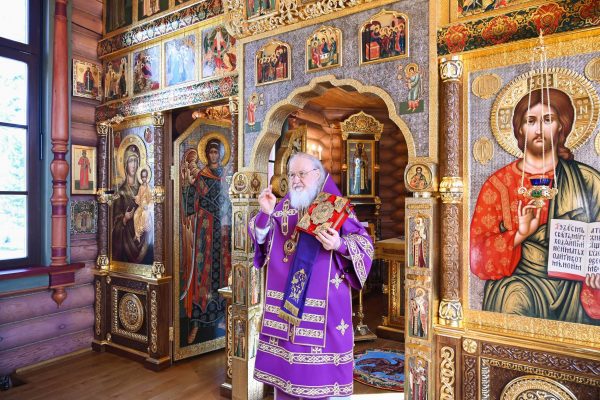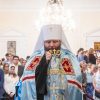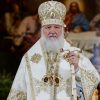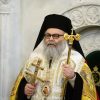On April 4, 2021, on the 3rd Sunday of Great Lent, the Adoration of the Holy Cross, His Holiness Patriarch Kirill of Moscow and All Russia officiated the Liturgy of St. Basil the Great at St. Alexander Church near Peredelkino.
At the end of the Liturgy, the Primate of the Russian Orthodox Church delivered a sermon:
“In the name of the Father and of the Son and of the Holy Spirit!
Saint Theophan said the following words: “It is better to suffer in this world and in this life than to suffer in eternal life.” He said this reflecting on the meaning of human suffering.
Indeed, there is not a single person who has not gone through suffering, through some kind of torment, even being outwardly sufficiently prosperous and happy; not to mention those who are outwardly disadvantaged, unhappy, who are sick, in need, who are disabled and, finally, those who are on their deathbed. This suffering belongs to our life.
God does not produce anything that is not good, because He is Love. All suffering and evil does not happen by the will of God (for God is not the creator of evil), but by the will of man. And we know from Holy Scripture how it all began – from the fact that the first people abandoned life according to God’s law, violated the Divine commandment, and therefore were removed from communion with God and were deprived of Divine grace, which protected them from all diseases and sorrows. An excess of Divine grace incinerated any attempt of evil being done by both people and the animals around them. Everything was in harmony, in mutual agreement, and everything was destroyed by human sin. Therefore, suffering is not original, but sin is, which means that the path of deliverance from suffering lies through overcoming sin.
And there are some analogies here, which, perhaps, we should think about. Among the suffering that falls to the lot of a person – conviction, imprisonment, prison, hard labour – these are the consentration and maximum manifestation of human misery, especially in combination with diseases and inner sorrows. But such sorrows do not happen to a person for no reason, but happen as a result of a crime, violation of the law and order. And in order for a person to repent, in order for him to be cleared of any charge, he goes through punishment, because imprisonment is the punishment for the committed crime.
And why test human health, will, why strain the human psyche? Why lead a person through grief for a crime they have committed? All this fits into a certain logic of human life, but it also has a deeper meaning, because imprisonment has as its goal not just punishment, but the correction of a person. What is the use if a person is punished, but not corrected, as we know, this often happens? But the real punishment for a person after the crime he has committed has correction as its goal.
What does this mean? This means that a person must atone for his crime, his sin, by suffering. And if this is true and fits into the logic of human existence in relation to each of us, then how much all of this is true in relation to all mankind, which was darkened by the commission of the original sin! And after the original sin, such huge, sky high, mountains of all iniquity and evil were committed by human will! And how could all this be forgiven to humanity without redemption?
The Lord, showing ineffable love for His creation, takes this torment upon Himself. He gives Himself, in His Only Begotten Son, to torment, to a terrible shameful death, which was supposed to atone for human sins and really atoned for them. This is the meaning of what was done on the cross. Of course, this is the greatest Divine mystery, but in the end, My ways are not your ways, says the Lord (Isaiah 55: 8). Indeed, the path of God is not a human path, and how can we, walking along our little paths, comprehend the greatness of the Divine path? But still, something is revealed to us, including through the word of God, and we understand that the cross, the terrible tortures and executions that the Son of God and the Son of Man, our Lord Jesus Christ, accepted is nothing, but redemption, which could really incinerate the sin of the entire human race – and the Lord did it all.
Today we remember His cross, His suffering, we bow before His cross and, as always, pray for our sorrows. This is how man was created – even kneeling before the cross, we pray for our sorrows. But, kneeling before the cross, we must first of all thank the Lord for His sacrifice, for His love for all of us, through which we received salvation and atonement for our own sins.
It is to the cross that the third Sunday of Great Lent, located in its very center, is dedicated, as well as the following week. All of this should help us through meditation, prayer, and reading of the Holy Scriptures not only to understand, but also to feel the Divine power that touched the human race and each of us, and through the suffering of the Son of God brought us deliverance.
May the experiences of the following week strengthen us in faith, as well as in the understanding that the sorrows that happen in our lives are necessary, just as the greatest sorrow of the Savior, nailed to the cross at Calvary, was necessary. Trials and tribulations should not break a person, much less deprive him of the faith. And even if a person starts to have the slightest hesitation of faith, which is often accompanied by the words “Lord, where are you? If you had existed, this would not have happened!”- then, as soon as this devil’s temptation touches our consciousness, let us look at the cross and understand that the Savior of the world suffered the most in order to atone for human sins. That is why, perhaps, the Lord allows our sorrows so that already here on earth we will atone for our sins and be worthy to enter His Divine Kingdom.
Protecting ourselves with the cross from all evil, from all doubts, from all hesitations in faith, let us walk the path of life with hope in the will of God, remembering that life’s trials are not sent down to us for no reason. There is a meaning in every sorrow through which we go through, and it is associated primarily with the atonement for our personal sins, so that, leaving all these sins here, we could enter the Kingdom of Divine glory pure and bright. Amen.”
You can follow Pravmir.com on Twitter, Facebook, Instagram, Telegram, or Parler

















